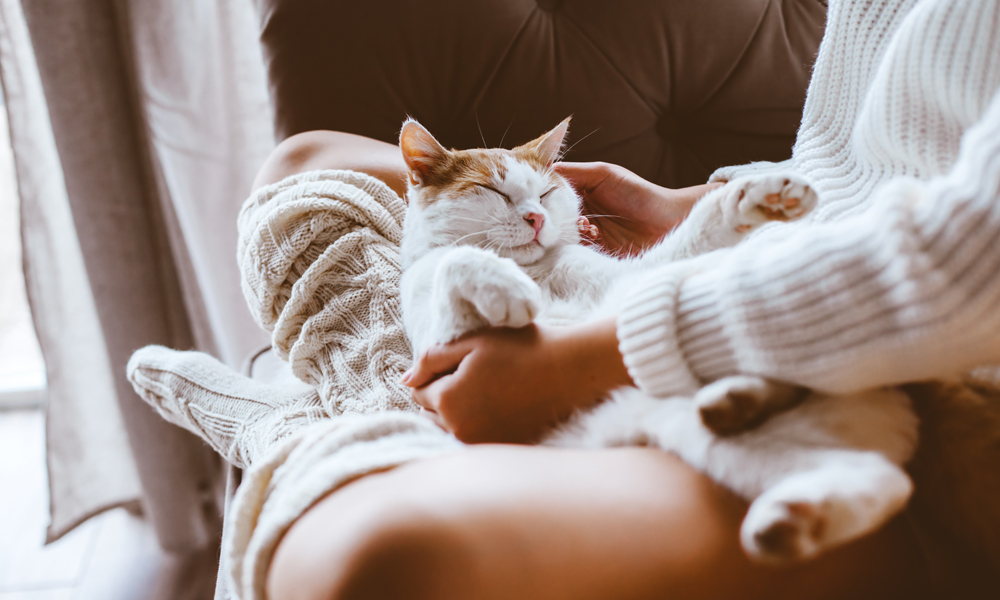Is your cat happy living with you?
When we decide to welcome a cat into our homes, we’re hoping for a great relationship. What we want is to give our feline friends the best life possible. Naturally, you wonder: Do felines bond with their humans? If so, how can you tell that it’s happened? While every cat has a different personality — some are aloof while others are purring snuggle bugs — understanding the nature of feline love can help you decode your cat’s heart.
Are cats happy living with humans?
Cats have a reputation for being independent. After all, they’re the pet you can leave at home for three days. And we all know someone who lets their feline come and go as they please (though more pet parents are seeing the health benefits of committing to the indoor cat model). Turns out, cats are just as attached to us as dogs are, according to this Oregon State University study. Researchers observed how cats responded when their people returned after an absence and concluded cats view them as a primary source of security and comfort.
Even if your furry friend displays a more avoidant and ambivalent response to you, you can safely conclude that Kitty loves you more than you might suspect. (If you’re unsure, get to know the health benefits of keeping cats indoors full-time while meeting their needs for exercise and stimulation). Signs of affection from non-snuggly kitties include:
- turning their back
- showing their belly
- sitting and blinking at you
- head-butting
How to tell if your cat is unhappy
All cats display these behaviors occasionally, but when you see these signs daily, think like a detective and look for clues. What makes kitty content and what makes them uneasy?
Body language
Anyone who’s spent time with a cat knows that when they hiss, they’re feeling stressed or threatened. But uneasiness shows up in other signs. If your cat has their ears back or is holding the tail horizontally, something is causing stress.
Actions
Disappearing acts, such as hiding or bolting from the room, are sure signs of stress. If your cat is peeing in unexpected places instead of the cat box, that’s another red flag that your cat is feeling stressed, whether they’re adjusting to a new home, or feeling overwhelmed by too much attention from another household member (such as a child or another pet). However, before you attribute the peeing to stress, your cat should be seen by a vet to rule out underlying medical issues.
How to build trust with your cat
Happy cats view humans as a source of security and comfort. If you’re looking to build on your relationship with kitty, our starter list can help. But the wonderful (and sometimes infuriating) thing about the cats we love is they can come in wildly different personalities.
Respect their space
A cat-loving houseguest, a friend-seeking child, a curious dog — these situations can lead to a stressed-out cat that desperately needs some “me” time in his safe space. The quickest way to make kitties feel insecure is demanding interaction when they want to retreat. If kitty makes an exit when you or someone else wants to play or have cuddle time, respect their decision and leave them be.
Use context to interpret purring
When cats purr, we take it as a sign of contentment and an invitation to offer attention. Cats do purr when content, but they also purr when stressed as a way to self-soothe. Before you reach out to give kitty an ear rub, pay attention to the situation and their body language. If they’re in their hideout or their tail is twitching, give your purring cat some distance.
Dole out treats
Food is the way to a cat’s heart. If you find a treat they absolutely love, use it as leverage to gain trust. Sit on the floor, offering a treat in an outstretched hand, giving them as much time as they need to take it. From there, progress to leaving the treat on your lap. As your nervous kitty becomes more comfortable with you, they won’t be afraid to get close!
Follow a routine and stick to it
Pets are creatures of habit, and routine makes them feel safe. Keeping feedings and playtime on a schedule makes cats feel secure knowing you’re a reliable source of sustenance and companionship.
Minimize loud noises
Barking dogs, noisy children, music at a loud volume, and vacuum cleaners can be unsettling to any cat, particularly those with sensitive dispositions. If noise can’t be avoided, allow kitty to escape to another room far from the source.
How long does it take to build trust with a cat?
The key to building trust with a cat is being patient — their timeline may not match with yours. Every cat comes with a unique personality, meaning some outgoing cats become full-fledged family members in moments, while shyer, more cautious kitties need a few weeks to acclimate. If you want kitty to approach you, spend time being still in a quiet room together — reading a book or watching a movie with headphones on — and give them time and space to watch, make up their minds and investigate.
Bottom line: Building trust with your cat starts with helping them feel safe and secure in your home and in your presence.
A high-quality diet that keeps your cat’s gut ecosystem in balance will help kitty better absorb essential nutrients, keep their immune system in top working order, and promote well-being. NutriSource is proud to formulate all its pet diets with their innovative Good 4 Life® system that builds good gut health in felines and a better litter box experience for you. Shop local and find NutriSource at an independent pet retailer near you.


